Distinguishing between fake and real 2009 Menghai 7572 901
Posted: Feb 3rd, '10, 22:56
Recently I had the experience of acquiring 42 pieces of fake 2009 Menghai Dayi 7572 901 ripe tea. The counterfeiters are getting better year after year, and have become so proficient that I believe some market participants will disagree that the photos below show a fake Dayi product.
FAKE

1. There is no dapiao 大票.
The big piece of paper telling you the manufacturer, name of the tea, often year, and other vital information of the tea in question that usually comes with a jian of tea. This time it is missing.
FAKE

2. The hologram label on the tong
Take a look at the outer label. The vertical hologram
strip does not disappear completely. It has also been placed rather haphazardly and not completely pressed against the paper.
FAKE

3. The paper quality and ink quality
This is where it gets interesting. The fake product actually looks better than the real product.
Real product on the left. Fake product on the right. The fake is made of thicker paper and the brown and blue ink colours are darker.
Just look at the numbers on the blue ink colour logo on the right - the blue serial numbers are too deep and thick to be real.

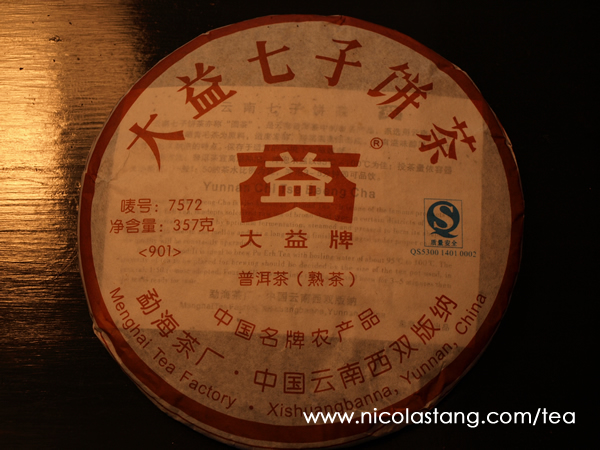

4. The way the wrapper is wrapped
Here is another tell-tale sign.
The real product is on the left - note how the wrapper is wrapped with the label over the brown words.
The fake product on the right - the wrapper is wrapped such that most of the brown words are obscured.



5. The wrapper label
This is the single most useful feature in determining counterfeits.
(a) Note how the fake wrapper label is haphazardly affixed on the wrapper. It is not completely pressed on the paper. It was probably affixed manually rather than by machine.
(b) Note that the vertical hologram stripe is different on the fake and the real. The fake stripe does not completely disappear away when it goes under.
(c) Note that the real hologram stripe has the "dayi" words on it and is more shiny.
(d) Note that the real wrapper label has three colours - yellow, orange and dark orange (almost vermillion). The fake wrapper label only has two colours - yellow and orange. This is hard to tell from the photos but it is very apparent when you see it in person. This is the most obvious sign of a fake.
(e) The texture of the real wrapper label is thicker and coarser than the fake wrapper label.
FAKE
 .
.
REAL


6. The neifei 內飛
The neifei in the fake is completely deliberately obscured by the tea leaves, as though the counterfeiter has something to hide.
FAKE


The neifei in the real cake is only partially obscured.
REAL

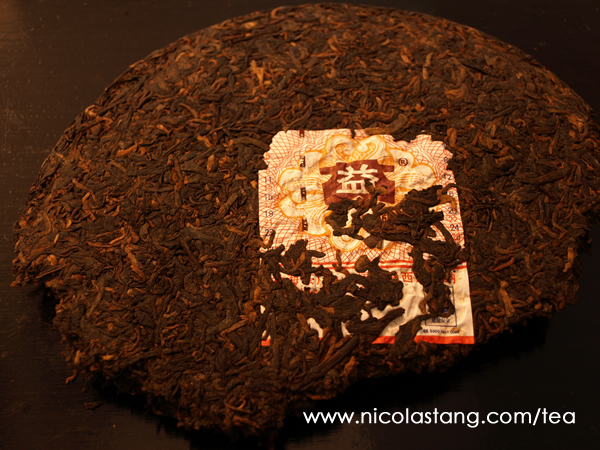
The neifei in the real cake has
(a) square corners
(b) distinct orange, blue and red colours
(c) clear vertical hologram
(d) blue and red numbers on the left and right margins
(e) been properly affixed on the cake
REAL

The neifei in the fake cake has
(a) rounded corners (very important distinguishing trait)
(b) no clear vertical hologram
(c) no blue numbers on the left and right margins
(d) not been properly affixed on the cake (see bottom left of label is sticking out)
FAKE


7. The visual quality of the tea leaves
The fake cake contains foreign objects, like twigs and unknown clump of white dirt.
The real cake only contains tea.
FAKE
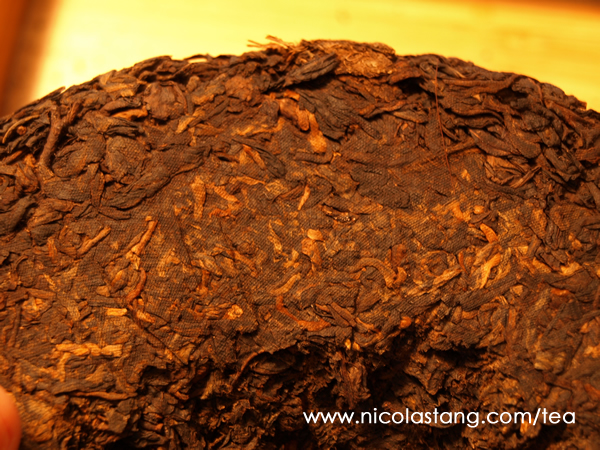

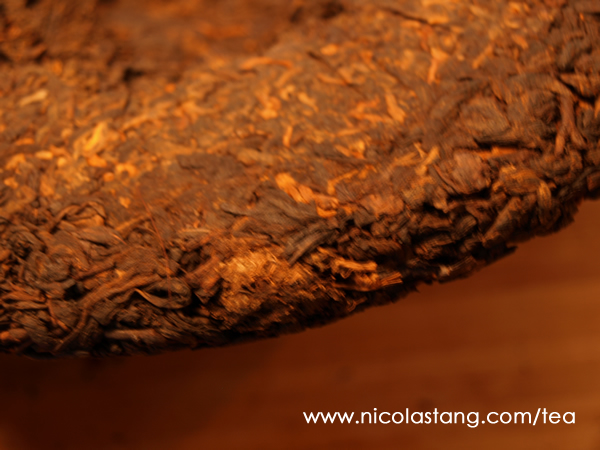
REAL

8. Drinking the tea
It is hard to distinguish based on a visual inspection. However if you drink both teas, the fake has a smoky taste and an offensive taste of detergent. The real tea just tastes like a 7572 should and has no offensive additional taste.
Real on the left, fake on the right

Initial Conclusions
The fake puerh tea market is alive and thriving. I recently attended the 2009 Shenzhen tea expo and spotted many more Dayi fakes (apart from 7572). The only way for innocent consumers to avoid acquiring fakes is to buy from reliable known sources like Yunnan Sourcing or authentic Dayi dealers on Taobao. Here are some pictures I grabbed from Yunnan Sourcing - you can see that they sell genuine products. Please note however it would be cheaper to buy from authentic Dayi dealers on Taobao as Yunnan Sourcing marks up its prices (which they are entitled to do so).
Images courtesy of Yunnan Sourcing:
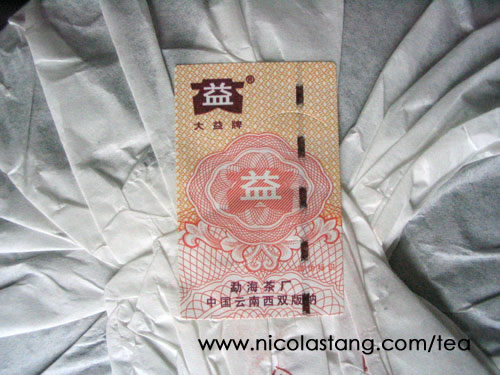

http://www.nicolastang.com/tea/articles ... 097572901/
FAKE

1. There is no dapiao 大票.
The big piece of paper telling you the manufacturer, name of the tea, often year, and other vital information of the tea in question that usually comes with a jian of tea. This time it is missing.
FAKE

2. The hologram label on the tong
Take a look at the outer label. The vertical hologram
strip does not disappear completely. It has also been placed rather haphazardly and not completely pressed against the paper.
FAKE

3. The paper quality and ink quality
This is where it gets interesting. The fake product actually looks better than the real product.
Real product on the left. Fake product on the right. The fake is made of thicker paper and the brown and blue ink colours are darker.
Just look at the numbers on the blue ink colour logo on the right - the blue serial numbers are too deep and thick to be real.



4. The way the wrapper is wrapped
Here is another tell-tale sign.
The real product is on the left - note how the wrapper is wrapped with the label over the brown words.
The fake product on the right - the wrapper is wrapped such that most of the brown words are obscured.



5. The wrapper label
This is the single most useful feature in determining counterfeits.
(a) Note how the fake wrapper label is haphazardly affixed on the wrapper. It is not completely pressed on the paper. It was probably affixed manually rather than by machine.
(b) Note that the vertical hologram stripe is different on the fake and the real. The fake stripe does not completely disappear away when it goes under.
(c) Note that the real hologram stripe has the "dayi" words on it and is more shiny.
(d) Note that the real wrapper label has three colours - yellow, orange and dark orange (almost vermillion). The fake wrapper label only has two colours - yellow and orange. This is hard to tell from the photos but it is very apparent when you see it in person. This is the most obvious sign of a fake.
(e) The texture of the real wrapper label is thicker and coarser than the fake wrapper label.
FAKE
 .
.REAL


6. The neifei 內飛
The neifei in the fake is completely deliberately obscured by the tea leaves, as though the counterfeiter has something to hide.
FAKE


The neifei in the real cake is only partially obscured.
REAL


The neifei in the real cake has
(a) square corners
(b) distinct orange, blue and red colours
(c) clear vertical hologram
(d) blue and red numbers on the left and right margins
(e) been properly affixed on the cake
REAL

The neifei in the fake cake has
(a) rounded corners (very important distinguishing trait)
(b) no clear vertical hologram
(c) no blue numbers on the left and right margins
(d) not been properly affixed on the cake (see bottom left of label is sticking out)
FAKE


7. The visual quality of the tea leaves
The fake cake contains foreign objects, like twigs and unknown clump of white dirt.
The real cake only contains tea.
FAKE



REAL

8. Drinking the tea
It is hard to distinguish based on a visual inspection. However if you drink both teas, the fake has a smoky taste and an offensive taste of detergent. The real tea just tastes like a 7572 should and has no offensive additional taste.
Real on the left, fake on the right

Initial Conclusions
The fake puerh tea market is alive and thriving. I recently attended the 2009 Shenzhen tea expo and spotted many more Dayi fakes (apart from 7572). The only way for innocent consumers to avoid acquiring fakes is to buy from reliable known sources like Yunnan Sourcing or authentic Dayi dealers on Taobao. Here are some pictures I grabbed from Yunnan Sourcing - you can see that they sell genuine products. Please note however it would be cheaper to buy from authentic Dayi dealers on Taobao as Yunnan Sourcing marks up its prices (which they are entitled to do so).
Images courtesy of Yunnan Sourcing:


http://www.nicolastang.com/tea/articles ... 097572901/